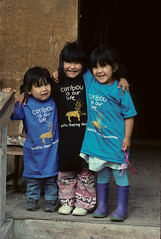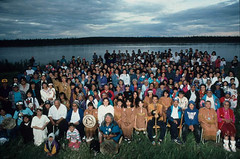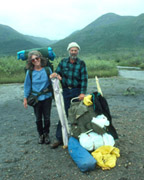The Gwich’in and the Arctic National Wildlife Refuge
© From National Wildlife Magazine: Above timberline, above Arctic Village, Alaska—120 miles above the Arctic Circle—my wife, Jane, and I watch with Kenneth and Caroline Frank, a Gwich’in Indian couple, as the first caribou of the season return from summer calving grounds located along the Arctic Ocean. Though Kenneth is a hunter, he restrains himself. Customarily, the Gwich’in permit the first caribou of the season to pass so they won’t turn tail and alarm the closely-trailing major herd. “We should wait,” says Kenneth. “There will be more in a day or so.”
For Kenneth and Caroline—and for all the Gwich’in—the return of the caribou is a major event. For many of this most northern of all Indian tribes spanning two nations in about 13 different small villages, the return means that stomachs will be full when it is 70 degrees below zero and game is not moving. But there is more. Now, when the caribou return, the migration is cause for even more celebration, for it means the Gwich’in have thwarted another year of attempts to undermine their way of life. If petroleum companies have their way, they will construct oil rigs in the precise area where members of the Porcupine Caribou Herd have always calved. The Gwich’in are firmly united in their denunciation of these efforts by oil companies and say so in a variety of ways that represent their concerns for themselves and the caribou…
That’s the way I began my story for National Wildlife magazine, and now, several years later, I stand by my convictions that there needs to be one place left in the world where natural processes regulate rather than ones imposed by man. If it means I have to pay more at the pump for gasoline to enjoy the travel I so thoroughly cherish, so be it. Higher prices may prompt us as a nation to do some of the things we should have done 30 years ago during our first national energy scare. But all is not lost. This current energy crisis might prompt us to develop bio fuels, purchase small cars (which Janie and I have done for times we’re traveling in Montana, our home state), improve further hybrid vehicles, and explore alternative sources of energy. It might prompt us to insist that our government become involved in the Kyoto Accord. It might prompt us to drive 55.
But to open the Arctic National Wildlife Refuge and convert it into another Prudhoe would be a travesty. And I say this not as someone who has never stepped foot in the refuge, rather as one who has backpacked (A Christian Science Monitor story) through the entire refuge, floated its rivers, and stood in awe and watched as thousands of caribou streamed across cold, Arctic rivers. As well, Janie and I once served as teachers in many of the Gwich’in Indian communities, and we have a real soft spot for all the people of these most northern of all Indian (not Eskimo) communities.
Several years ago I flew over Prudhoe Bay on a photography assignment for The Wilderness Society. The flight was an eye opener; sprawling beneath like the filaments in a spider web was a dense interlay of pipes. From these conduits forming the Pipe Line, statistics show oil spills on average of ONCE A DAY.
Biologists working for the oil companies say the Central Caribou herd has expanded, implying that oil pads and dericks are good for caribou. What they don’t say is that in the area of Prudhoe Bay, the Brooks Range sweeps to the south, creating a seperation between the Arctic Ocean and the mountains of about 100 miles. This seperation provides the Central Caribou herd with room to move, so its no wonder that herd has not been troubled. But such is not the case in the Arctic National Wildlife Refuge where the Brooks Range holds firm at about 30 miles from the Arctic Ocean. Here is where the Porcupine Caribou herd gathers each summer to calve, and “Here,” as Sarah James (Another Christian Science Monitor story “The Power of One”) of Arctic Village says, “the caribou got no place to go.”
If we were to tap oil in the refuge, we coudn’t have it at our pumps for another 10 years, and most believe the supplies are limited. Wouldn’t it be a shame to eliminate one of the world’s last totally wild places in exchange for some unknown quantity of oil? I want to maintain my life stye as an adventure travler, and if I have to pay more to do so, then I’ll sacrifice elsewhere.
Hurrah for the Gwich’in, who stand united in their determination to save the Arctic Refuge from development.




March 25th, 2007 at 8:22 pm
Hi Bert and Jane,
I really enjoyed your website. It made me miss home, being in Arctic Village with my parents. I’m graduating from college this May, I’m really excited. I just wanted to say hi, from Alaska.
-Crystal